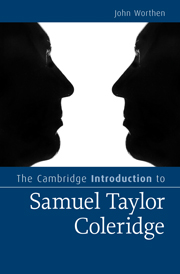Book contents
- Frontmatter
- Contents
- Illustrations
- Preface
- Acknowledgements
- Abbreviations
- Chapter 1 Early life and contexts: 1772–1802
- Chapter 2 Poetry
- Chapter 3 Notebooks
- Chapter 4 Mid-life works and contexts: 1803–1814
- Chapter 5 Language
- Chapter 6 Criticism
- Chapter 7 Later works and contexts: 1815–1834
- Afterword
- Notes
- Further reading
- Index
- Cambridge Introductions to Literature
Chapter 2 - Poetry
Published online by Cambridge University Press: 05 August 2012
- Frontmatter
- Contents
- Illustrations
- Preface
- Acknowledgements
- Abbreviations
- Chapter 1 Early life and contexts: 1772–1802
- Chapter 2 Poetry
- Chapter 3 Notebooks
- Chapter 4 Mid-life works and contexts: 1803–1814
- Chapter 5 Language
- Chapter 6 Criticism
- Chapter 7 Later works and contexts: 1815–1834
- Afterword
- Notes
- Further reading
- Index
- Cambridge Introductions to Literature
Summary
The years 1797–8 changed Coleridge's writing of poetry (indeed his whole subsequent life) for ever. Not only did he meet William Wordsworth, but he also started to write the poetry of dream, nightmare and vision, created in simple, everyday language, with striking rhythms and insistent, repeated rhymes. The strangest and most fantastic things resulted. Even such undervalued works as the incomplete prose poem ‘The Wanderings of Cain’, the unfinished ballads ‘The Three Graves’ and ‘The Ballad of the Dark Ladiè’, and the weird little ‘Fire, Famine and Slaughter’, have their moments of horrible power. In the last named, Famine announces a recent sighting: ‘A baby beat its dying mother: / I had starved the one and was starving the other’ (CPIi. 442).
To the same period belong the three poems for which Coleridge is still best known: ‘The Ancient Mariner’ (finished but constantly revised), ‘Christabel’ (clearly unfinished) and ‘Kubla Khan’ (which he declared unfinished); all three in different ways taking us imaginatively into the dark places of the mind, in particular into the experiences of power and of its loss in nightmare.
It was once traditional to ascribe such a development in Coleridge's poetry to his use of opium, but distinguishing what a subtle and well-stocked mind might be able to imagine with or without opiates is impossibly difficult, and attempting to be more precise (by, say, identifying the figure of Life-in-Death in ‘The Ancient Mariner’ with the bringer of opium nightmares) is simply arbitrary.
- Type
- Chapter
- Information
- The Cambridge Introduction to Samuel Taylor Coleridge , pp. 18 - 40Publisher: Cambridge University PressPrint publication year: 2010



